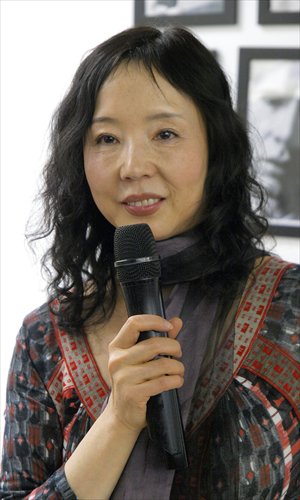Author draws on family ties

When it comes to Yan Geling, writer of the novel that has been made into the upcoming movie The Flowers of War, many people think of the author's female characters, such as Tian Sufei in her book A Woman's Epic, Tasuru in Little Aunt Tasuru and Wang Putao in The Ninth Widow. All of these heroines are beautiful, tough, true and honest. In her latest novel, Lu Yanshi-The Prisoner, however, Yan makes a departure from her signature characters and focuses on a male professor born into rich family of the old days. The book depicts the title character's life experiences and spiritual exploration, and the character is a prototype of Yan's grandfather.
"I never met my grandfather, so he has a god-like mystery for me," she said in a press last week. Writing a book about her grandfather has been her life-long dream. While studying in America, she visited the school her grandfather had attended, and throughout her youth she pestered the elders in her family to tell her whatever they could about him. For years, she has been collecting scraps of stories and images in the process of composing this book.
To research the nature of her grandfather's life in Qinghai Province, she made three visits to its grasslands and deserts and studied the local customs and practices to bring life to the characters of the book. "After all, it's my first time depicting an elite character and he is very important to me, so I worked very hard on this book. As writers, we should be diligent and spend a lot of time accumulating materials. Doing the proper work ahead of time makes the writing process come more easily."
Converting real history into living details is not difficult for Yan Geling. She said that most of the content of Lu Yanshi-The Prisoner is from her imagination.
In the readers' eyes, every detail in the book should be as true to life as their own experiences. "I think that a writer should not simply copy the details of real life. Instead, a writer must have an imagination and use details to complete her characters," said she.
The story of her grandfather isn't a happy tale to remember. The title suggests a life of imprisonment. Yan said that in the old days, the oldest son of a family didn't have any freedom, and while Lu Yanshi was literally a prisoner in Qinghai, he lived his entire life without freedom. In this work, Yan sheds light on what she has come to understand to be the meaning of freedom as seen by intellectuals of that generation.
When the book was finished, Yan deleted about 100,000 Chinese characters. Later she added another 10,000 describing her grandfather's life in America. "Western writers emphasize information in books. But I think it's more important to have enough meaning beneath the words. When I was writing the book, I constantly connected the leading character with my understanding of myself, for these distant blood relations exert a strong force in each of our lives. The more I learned about my grandfather, the more I learned about myself. The origin of literature as an art form lies in our need to understand humanity and ourselves."
Yan mentioned another tragedy related to this book: her father, Xiao Ma, who had helped her create the book, suddenly passed away before it was completed. She said she inherited her father's concern for his country and people. Many of her characters reflect these values that were passed down from her father.
Yan Geling is a talented and prolific writer with high artistic standards. She said that as a child, she enjoyed making precocious remarks. Now she pursues the clear portrayal of emotion in her writing. In her eyes, the supremacy of words is to be found in accuracy, honest description and plain images, rather than beauty.
For her, writing is an art form that reflects the intensity of life.